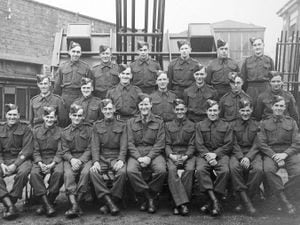Wolverhampton man of letters looks back at the golden age of writing in new book
Violent behaviour at the chapel. Complaints about having to walk to the sea. Gripes about low-hanging trees catching umbrellas.

It can only be the letters page of the local newspaper. The grumblings of people from provincial towns over the centuries is the focus of a new book by Wolverhampton-born author Nigel Cawthorne.
The book, entitled I Don't Believe It – Terrific Outrage from Middle England, is the result of hours spent by Cawthorne trawling through old newspapers in the British Library, and having a fair few chuckles along the way.
Many of the letters from the 19th and early 20th century look very much like a pre-social media form of cyber-trolling. This is particularly true of a letter, appropriately signed "G A S", where the writer appears to be taking a disagreement with a fellow correspondent a little too personally:
"My offer made to accompany him (minus a respirator) into a mustard gas chamber still holds good," wrote the correspondent, somewhat menacingly.
There is no "Disgusted of Tunbridge Wells", which was the title of one of Cawthorne's previous books. And there are not actually any letters from his home-town paper the Express & Star, which was a comparatively late adopter of the readers' letters page. But there do appear to be a disproportionately high number of peeves from the seaside town of Whitstable in Kent.
One of them, who signed his letter "A Damaged Blackout Walker", called for action to be taken about low-hanging trees.
Writing to the Whitstable Times and Tankerton Press at the beginning of blackout regulations in November, 1939, the reader observed: "A number of people have trees in their front gardens which overhang the pavement and are often so low as to come into contact with heads, hats and umbrellas. In the present ‘black-out’ conditions this is particularly troublesome. The local council ought to help."
Another letter to the Whitstable Times, dated February, 1879, describes some rather unseemly behaviour at the end of a chapel's evening service.
"Rev Mr Blandford was confined to the chapel until 10 o’clock, singing and abusive threatening being carried on, and Mr Sands was threatened by three different persons’ clenched fists in his attempt to escape," the writer observed.
"The meeting was only dispersed by the key of the chapel being reluctantly given to the gang from Herne Bay who had previously done service."
Cawthorne, who has written more than 200 books, including biographies of Jeremy Corbyn and Sir Keir Starmer, says letters to the editor represent an amazingly entertaining window on every-day concerns.
"They are much more lively than history books, because a real person is telling you what is bothering them and why about their daily lives," he says.
Cawthorne says the letters also demonstrate a degree of wit and nuance sadly lacking in exchanges on social media.
"Sometimes these letters are very moving indeed, sometimes laugh-out-loud funny to us," he says.
"Before the internet turned complaining into a channel of snarkiness, trolling and vicious shouting, Britain had the subtle skill of invective down to an art."
One particularly strange letter to the Whitstable Times, dated August, 1884, was full of praise of the beach at Tankerton, saying all it lacked was some kind of device to transport bathers into the sea: "I found only one thing wanting in Tankerton, and that is a few more bathing-machines that can be run into the sea when the tide is ebbing, so that bathers have not to run a distance from thirty and fifty yards before reaching the water."
It seems that at least one reader of the Maidstone Telegraph was very concerned about an "intolerable nuisance" on the seafront.
"I allude to the assembling on the Sabbath of a number of the lowest blackguards near the barrack pier, playing ‘pitch and toss,’ and insulting every respectable female that passes," wrote "J S", in November, 1863.
Cawthorne says the letters are usually tongue-in-cheek, although that does not mean there is not real anger behind some of them.
"Things are usually treated in a light-hearted manner – indeed, with a proper British insouciance," he says.
"But sometimes there is a stiff upper lip and a lower one quivering with barely suppressed rage".
Another Whitstable Times reader, going by the pen-name "Disturbed", wrote in January, 1889 asking: "What steps should be taken to prevent the intolerable nuisance which is caused by boys and girls ringing the street door bells of tradesmen on Sundays?," adding that his own bell had been rung no fewer than 16 times.
"Where are the police?" he added.
Writing to the same newspaper, in April 1890, a reader using the pseudonym "Anti-Agitator" voiced concern about union militancy being brought in from overseas:
"Sir – We have had an invasion of foreign agitators, whose object appears to be to throw discontent amongst the working men of Whitstable.
"The invaders, augmented by a crowd (not representative working men), paraded the streets on Friday last with considerable noise, to establish a union."
Cawthorne says venting one's anger is a basic human need, but the art of newspaper letter-writing is also a peculiarly British phenomenon borne from centuries of free speech.
"The UK is exceptional in that opinions could always be expressed liberally," he says.
"It has almost become an inalienable right to splutter, rail, and rant about anything and everything.
"The principle found an early expression in Magna Carta, arguably in a way the first letter to the ‘editor’.
"From there the right has grown spectacularly successfully and turned into democracy, spreading around the world. Not a bad result."
I Don't Believe It – Terrific Outrage from Middle England, by Nigel Cawthorne, is published by Gibson Square books priced £9.99.





